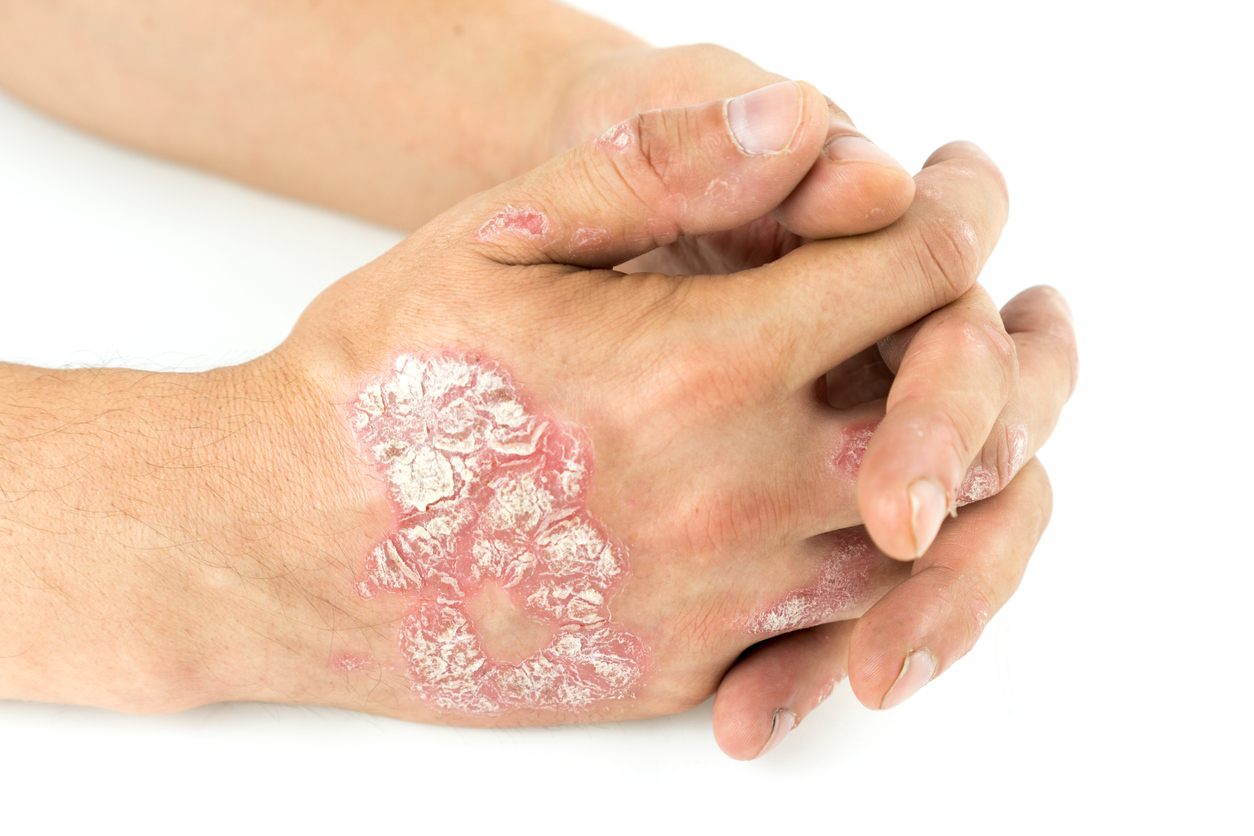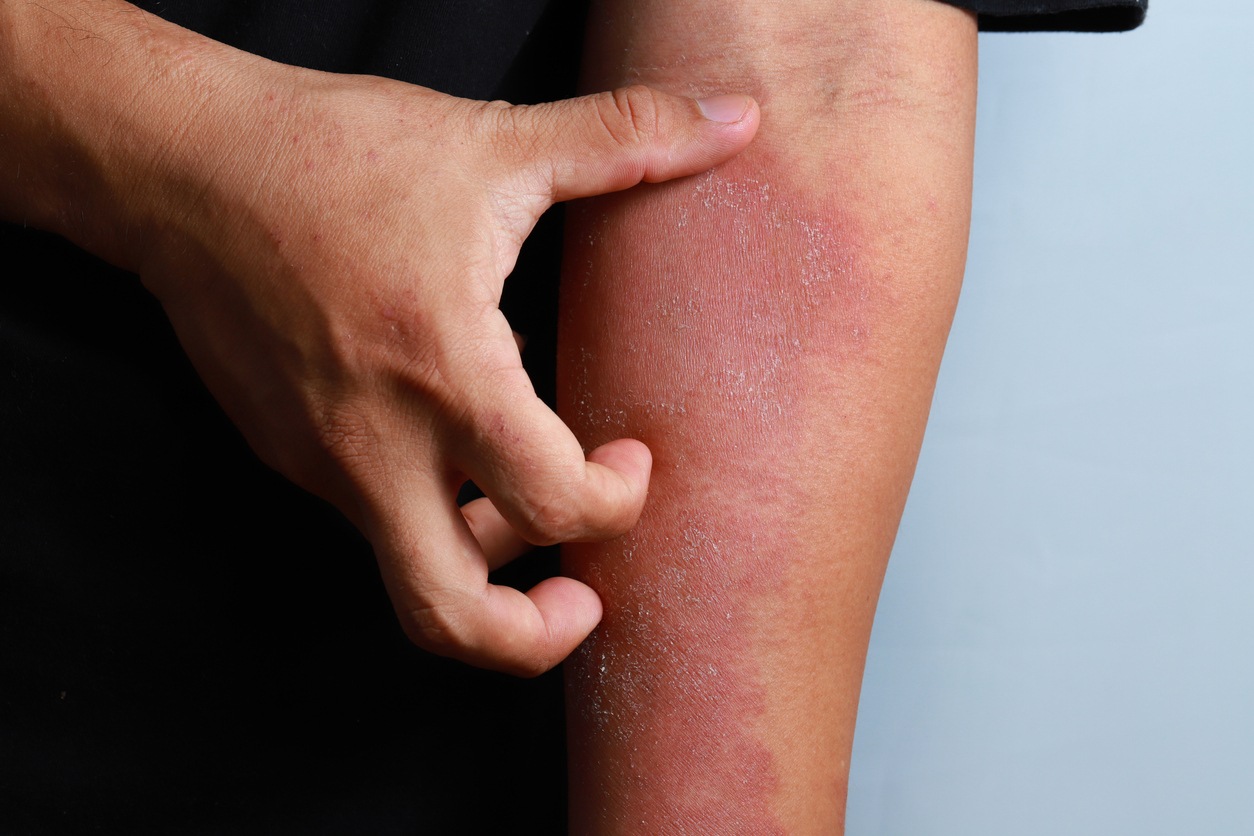Eczema vs. Psoriasis: How to tell which one it is?
Both eczema and psoriasis are inflammatory skin conditions. They share some symptoms —namely areas of red, dry, itchy skin—as well as some treatments. Neither is contagious, and both come and go over the course of a lifetime. However, they are not the same condition.
It’s not always easy to tell eczema and psoriasis apart at first.
- Psoriasis is marked by raised, reddened, thick plaques that can itch and cause a burning sensation. Psoriasis can strike any part of your body, but it is most commonly seen on the knees, elbows, lower back and scalp. These plaques may be covered with silvery scales that can flake off due to your immune system overproducing skin cells that don’t shed normally.

- Characterized by red and itchy patches of skin, eczema can appear similar to psoriasis, but tends to be more itchy and blotchy in appearance. Exactly where eczema occurs is based on the type and your age. Atopic dermatitis, for example, tends to begin in the folds of the elbows or knees, neck, wrists, ankles, and/or crease between the buttocks and legs, first appearing in very young children.

Understanding psoriasis
Psoriasis affects more than 7.5 million U.S. adults. It occurs when your body’s immune system goes into overdrive and revs up skin cell production. These cells don’t shed. Instead, they build up on skin. There are many types of psoriasis. The most common one is plaque psoriasis.
Other types include:
- Genital psoriasis. As the name suggests, this form of the disease occurs on and around the genitals.
- Palmoplantar psoriasis. This form of the disease occurs on the hands and feet.
- Guttate psoriasis. This less common type of psoriasis is characterized by smaller raised plaques than other forms of the disease.
Psoriasis triggers may include:
- Stress
- Skin injury
- Illness
- Weather
There is some suggestion that allergies, certain foods, alcohol or environmental factors may trigger psoriasis.
There is no cure for psoriasis, and a growing body of evidence suggests that the inflammation associated with the condition also increases the risk for other diseases down the road, including heart disease. Psoriasis tends to travel with the joint pain and inflammation of psoriatic arthritis. In fact, psoriatic arthritis affects about 30 % of people with psoriasis, according to the National Psoriasis Foundation.
Psoriasis treatment can include topicals p laced on your skin such as steroids to reduce inflammation and/or calcipotriene, a form of vitamin D that slows down skin cell growth.
Light therapy may also be used to slow down the growth of skin cells.
Systemic drugs such as biologics block key proteins that drive the inflammation in psoriasis. Biologics used to treat psoriasis include:
- Tumor necrosis factor inhibitors (TNF inhibitors), such as Enbrel (etanercept), Cimzia (certolizumab pegol), Humira (adalimumab) and Remicade (infliximab)
- Interleukin inhibitors, including Cosentyx (secukinumab), Siliq (brodalumab), Taltz (ixekizumab), Ilumya (tildrakizumab-asmn), Skyrizi (risankizumab-rzaa), Tremfya (guselkumab) and Stelara (ustekinumab)
These more powerful drugs may help prevent some of the downstream consequences of psoriasis such as heart disease. Avoiding triggers and taking care of your skin can help keep psoriasis flares at bay.
Related questions
- What does psoriasis look like?
- How do you get psoriasis and is it contagious?
- How does Tremfya work?
Understanding eczema
More than 31 million Americans have some form of eczema . Eczema often first appears in early childhood, but it can occur at any age.
Exactly what causes eczema is unknown, but genetics and exposure to certain triggers seem to play a role. It is thought that an overactive immune system comes into contact with a trigger and responds by releasing inflammatory markers that cause symptoms, such as intense itching and inflammation.
There are many different types of eczema, including:
- Atopic dermatitis. This is the most common type of eczema and typically develops before the age of five.
- Contact dermatitis. With this type of eczema, the irritation and inflammation follow exposure to a specific substance.
- Dyshidrotic eczema. This type of eczema occurs on the hands and feet.
- Nummular eczema. This form of eczema is characterized by coin-shaped patches on the skin.
- Seborrheic dermatitis. This type of eczema occurs on the scalp and causes dandruff.
- Stasis dermatitis. This form of eczema occurs when there is pronounced swelling in the lower limbs.
Potential eczema triggers may include:
- Soap
- Laundry detergent
- Shampoo
- Bubble bath
- Body wash
- Fragrances
- Metals
- Cigarette smoke
- Household cleansers
- Fragrances
Like psoriasis, eczema also travels with other diseases and conditions. Fully one in three children with eczema will develop asthma or allergic rhinitis, and children with atopic dermatitis are six times more likely to develop a food allergy compared to children without this skin condition, according to the National Eczema Association.
The main symptom of eczema is chronic, relentless itch. Scratching only makes it worse and can increase the chances of developing a skin infection. You can try soothing the itch without scratching by taking a bath with oatmeal or baking soda.
Like psoriasis, eczema can have a dramatic effect on quality of life. The itching can interfere with sleep, and can increase the risk of mental health issues such as depression and anxiety.
Eczema is often treated with over-the-counter (OTC) remedies and prescription topical medications, including steroids, calcineurin inhibitors such as Protopic (tacrolimus) and generic options, and Elidel (pimecrolimus) and generic options, which prevent certain cells in the immune system from turning on to cause eczema symptoms.
Another option, Eucrisa (crisaborole), targets phosphodiesterase 4 (PDE4), an enzyme that kickstarts the production of different inflammatory proteins in the immune system linked to eczema.
Dupixent (dupilumab) is a biologic drug that can help treat moderate to severe atopic dermatitis in adults and children. It works by blocking proteins that kickstart the immune system’s overreaction and cause eczema symptoms.
As with psoriasis, prevention also makes a difference. Knowing what triggers an eczema flare and taking steps to avoid them as well as judicious use of moisturizer can help keep eczema flares at bay.
References
- National Psoriasis Foundation. About Psoriasis. Available at: https://www.psoriasis.org/about-psoriasis/
- American Academy of Dermatology (AAD). What’s the difference between eczema and psoriasis? Available at: https://www.aad.org/public/diseases/eczema/childhood/child-have/difference-psoriasis
- National Psoriasis Foundation. Causes and Triggers. Available at: https://www.psoriasis.org/causes/
- National Psoriasis Foundation. About Psoriatic Arthritis. Available at: https://www.psoriasis.org/about-psoriatic-arthritis/
- National Psoriasis Foundation. Phototherapy. Available at: https://www.psoriasis.org/phototherapy
- National Eczema Association. Eczema Stats. Available at: https://nationaleczema.org/research/eczema-facts/
- National Eczema Association. Available at: https://nationaleczema.org/eczema/
- National Eczema Association. An Overview of the Different Types of Eczema. Available at: https://nationaleczema.org/eczema/types-of-eczema/
- National Eczema Association. Eczema Causes and Triggers. Available at: https://nationaleczema.org/eczema/causes-and-triggers-of-eczema/
- National Eczema Association. Managing Itch. Available at: https://nationaleczema.org/eczema/itchy-skin/
- National Eczema Association. Managing Itch. Available at: https://nationaleczema.org/eczema/treatment/
Read next
How does Ilumya work to treat psoriasis?
Ilumya works by binding selectively to interleukin-23 (IL-23) which is a naturally occurring cytokine. IL-23 plays a key role in promoting inflammation and regulating other cytokines (such as IL-17) and inflammatory substances, such as TNF-α3-7. By blocking the effects of IL-23, Ilumya helps control the release of IL-17 and TNF-α, which reduces inflammation associated with psoriasis. It also decreases how many inflammatory cells are present within psoriatic lesions, helps prevent plaque formation, and resolves tissue damage. Continue reading
What's a good prednisone taper schedule?
The best prednisone taper will depend upon how long you have been taking the medicine, your dose, and why you are being treated. If you've been treated with a high dose of prednisone, or taken it for more than a few weeks, you will need to slowly stop your medicine, usually over a period of days, weeks or months. Your healthcare provider will determine your prednisone tapering schedule. Continue reading
Prednisone: What are 12 Things You Should Know?
Prednisone first came onto the market over sixty years ago and is still going strong. But did you know that this common drug used for a variety of different conditions also has some pretty serious side effects as well? Continue reading
See also:
Aimovig
Learn about Aimovig (erenumab-aooe) a once-monthly, injectable medication that can be ...
Botox
Botox is used cosmetically to reduce facial lines and wrinkles and for medical purposes for ...
Stelara
Stelara (ustekinumab) is used to treat Crohn's disease, ulcerative colitis, plaque psoriasis, and ...
Nurtec ODT
Nurtec ODT (rimegepant) is used to treat acute migraines and prevent episodic migraines, by ...
Depakote
Depakote is used to treat various types of seizure disorders. Learn about side effects ...
Topamax
Topamax (topiramate) is used to prevent seizures in adults and children and to prevent migraine ...
Emgality
Emgality (galcanezumab-gnlm) is a CGRP antagonist for the preventive treatment of migraine and for ...
Timolol
Timolol is used for angina, heart attack, high blood pressure, migraine, migraine prevention
Valproic acid
Valproic acid is used for bipolar disorder, cluster-tic syndrome, epilepsy, headache ...
Divalproex sodium
Divalproex sodium is used for bipolar disorder, borderline personality disorder, cyclothymic ...
Related medical questions
- Where should you not use triamcinolone acetonide cream?
- What are the new drugs for plaque psoriasis?
- Why should I take folic acid with methotrexate?
- Is triamcinolone acetonide an antifungal cream?
- How do you use clobetasol propionate on your scalp?
- Clobetasol vs. triamcinolone - how do they compare?
- What is a substitute for fluocinonide cream?
- Sotyktu vs Otezla: How do they compare?
- How long does methotrexate stay in your system?
- Halobetasol vs. clobetasol - How do they compare?
- Does taking vitamin D help with psoriasis?
- Can clobetasol be used for toenail fungus?
- How long does it take for Skyrizi to work?
- What causes Plaque Psoriasis?
- What are 6 key Taltz side effects to watch out for?
- How does Taltz compare to Cosentyx for psoriatic arthritis?
- How long does clobetasol stay in your system?
- Does Feverfew interact with any drugs?
- What's the dosing schedule for Skyrizi?
- Is fluocinonide an antifungal cream?
- How long does it take for Otezla to work?
- How long should you use fluocinonide for?
- How do you inject Humira?
- Cosentyx vs Humira: How do they compare?
Drug information
- Psoriasin Information for Consumers
- Side Effects of Psoriasin (detailed)
- Psoriasin user reviews (15)
